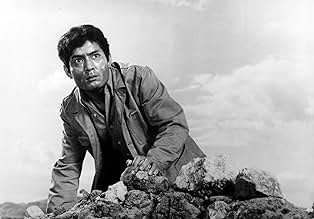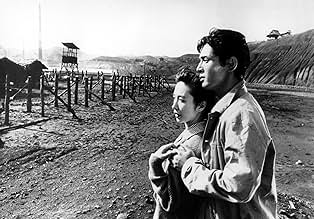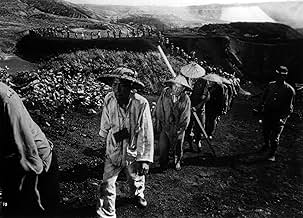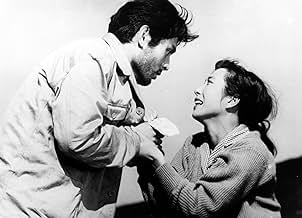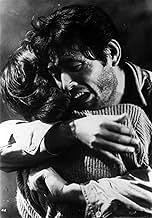La condition de l'homme: Il n'y a pas de plus grand amour
Titre original : Ningen no jôken
NOTE IMDb
8,5/10
9,9 k
MA NOTE
Ajouter une intrigue dans votre langueA Japanese pacifist, unable to face the dire consequences of conscientious objection, is transformed by his attempts to compromise with the demands of war-time Japan.A Japanese pacifist, unable to face the dire consequences of conscientious objection, is transformed by his attempts to compromise with the demands of war-time Japan.A Japanese pacifist, unable to face the dire consequences of conscientious objection, is transformed by his attempts to compromise with the demands of war-time Japan.
- Récompenses
- 5 victoires et 1 nomination au total
Kôji Nanbara
- Kô
- (as Shinji Nanbara)
Histoire
Le saviez-vous
- AnecdotesAccording to Tatsuya Nakadai, a marathon screening of the entire nine-and-a-half-hour "Human Condition" trilogy is held once a year in Japan, and he has once or twice attended these screenings, which are always sold out.
- GaffesAt one point a Japanese guard begins to whip Kao, yet the motions he makes are just a flailing of his arms, visibly missing the actor. Kao retaliates by throwing a rock at the guard, but the rock never strikes the guard. However, the actor playing the guard overreacts as if he has been struck.
- ConnexionsFollowed by La condition de l'homme: Le chemin de l'éternité (1959)
Commentaire à la une
This is the first of three very long movies that are based on Jumpei Gomikawa's six-volume series. It is set during WWII and is about a Japanese man named Kaji. Kaji is a very liberal man for the times--something that COULD be very dangerous in the militaristic Japanese society. When he's called up to fight in the war, he's torn. He's basically a pacifist at heart and cannot see himself killing another. Luckily for him, his boss gives him a choice--report for military duty or go off to Japanese occupied territory to be the production head for a forced labor camp. Not surprisingly, he goes to work at the camp--and takes his new wife with him.
When he sees the camp, Kaji is angered--the soldiers brutalize the workers and have absolutely no regard for them. The camp is also rife with corruption. He insists that the beatings MUST stop and he is opposed by the staff--but he's not willing to budge and he has the authority to make it stick. Fortunately, when the workers are better few and treated well, production increases dramatically. However, when there are prison escapes, the hardliners press for a return to brutality. After all, they feel, these aren't exactly humans--just Chinese and Korean conscripts and, worse, Japanese political prisoners. What is Kaji to do? As the film progresses, to save himself he may need to forget about his high ideals. But, can he live with himself? And what about his marriage? Because of the job, he's withdrawn and miserable--and a lousy husband. I'd say more, but this would ruin the film.
Overall, an excellent film that is worth seeing. I am excited to see what happens in the second film, as at the end of the first there is a BIG twist and Kaji's world has been turned upside down in the process. My only question is could this film STILL be a bit sanitized? From what I've read about these camps, they were MUCH more brutal than even the film portrayed.
When he sees the camp, Kaji is angered--the soldiers brutalize the workers and have absolutely no regard for them. The camp is also rife with corruption. He insists that the beatings MUST stop and he is opposed by the staff--but he's not willing to budge and he has the authority to make it stick. Fortunately, when the workers are better few and treated well, production increases dramatically. However, when there are prison escapes, the hardliners press for a return to brutality. After all, they feel, these aren't exactly humans--just Chinese and Korean conscripts and, worse, Japanese political prisoners. What is Kaji to do? As the film progresses, to save himself he may need to forget about his high ideals. But, can he live with himself? And what about his marriage? Because of the job, he's withdrawn and miserable--and a lousy husband. I'd say more, but this would ruin the film.
Overall, an excellent film that is worth seeing. I am excited to see what happens in the second film, as at the end of the first there is a BIG twist and Kaji's world has been turned upside down in the process. My only question is could this film STILL be a bit sanitized? From what I've read about these camps, they were MUCH more brutal than even the film portrayed.
- planktonrules
- 20 mars 2012
- Permalien
Meilleurs choix
Connectez-vous pour évaluer et suivre la liste de favoris afin de recevoir des recommandations personnalisées
- How long is The Human Condition I: No Greater Love?Alimenté par Alexa
Détails
- Date de sortie
- Pays d’origine
- Langues
- Aussi connu sous le nom de
- The Human Condition I: No Greater Love
- Lieux de tournage
- Hokkaido, Japon(Exterior scenes of the Manchurian mine)
- Sociétés de production
- Voir plus de crédits d'entreprise sur IMDbPro
- Durée3 heures 28 minutes
- Couleur
- Mixage
- Rapport de forme
- 2.35 : 1
Contribuer à cette page
Suggérer une modification ou ajouter du contenu manquant

Lacune principale
By what name was La condition de l'homme: Il n'y a pas de plus grand amour (1959) officially released in India in English?
Répondre

